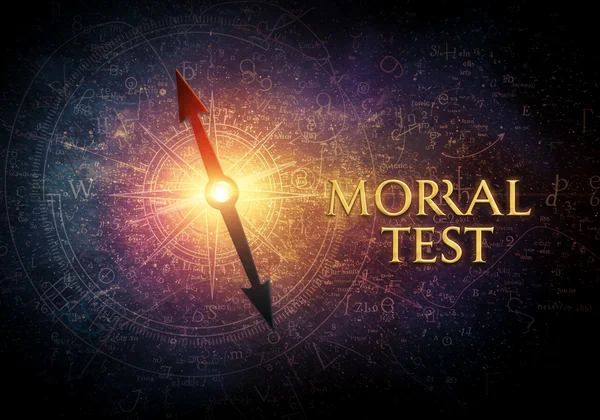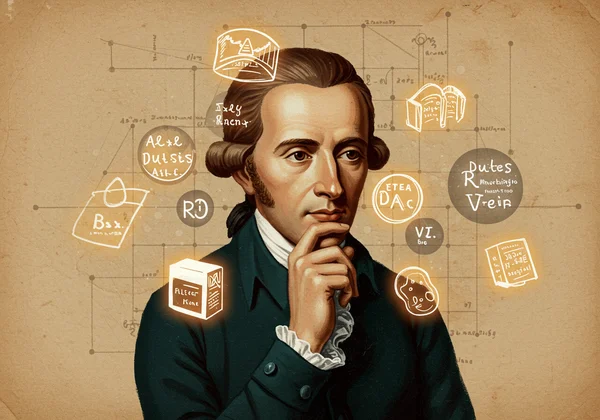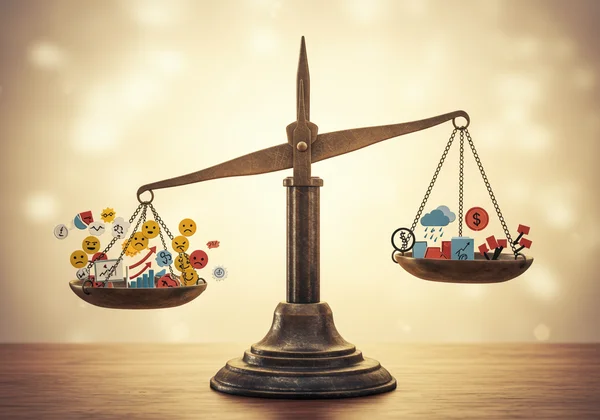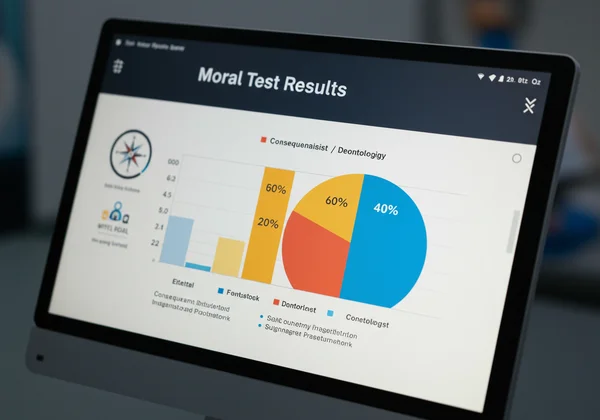道德測驗:義務論、結果主義與你的倫理核心
September 15, 2025 | By Julian Croft
你是否曾好奇,在道德危機時刻,究竟是什麼真正驅動著你的決定?對我們許多人來說,「 我如何探索我的道德和價值觀? 」是一個終生的旅程。在這探索的核心,存在著強大而流傳數世紀的倫理學理論,它們塑造著我們的行為,往往我們甚至沒有意識到。理解這些框架是校準你內在倫理指南針的第一步。本指南將探討倫理學的兩大基石——義務論和結果主義——並向你展示 道德測驗 如何能闡明你的個人取向。你準備好揭示你的倫理核心了嗎?你可以從我們的 免費道德測驗 開始。

義務論:義務與規則的倫理學
義務論是一種倫理學框架,它根據規則來判斷行為的道德性。對義務論者而言,某些行為本身就是對或錯的,無論其結果如何。這種觀點根植於義務和責任的理念——我們受一套必須遵守的道德法則所約束。這就像一本內在的規則手冊,用以指導你的行為。
什麼是義務倫理學?定義義務導向的道德
其核心是, 義務倫理學 主張道德是履行一個人職責的問題。這種方法與哲學家伊曼努爾·康德(Immanuel Kant)的關聯最為密切,它認為一個行為的後果與其道德價值無關。例如,義務論者會認為說謊總是錯誤的,即使這個謊言產生了好的結果,因為說謊這個行為本身就違反了誠實的道德義務。這種基於原則的道德為不同情境下的行為提供了清晰、一致的指導。

關鍵原則:定言令式與普遍法則
康德倫理學的基石是 「定言令式」 的概念。這個原則指出,你應當只依據你願意其成為普遍法則的規則去行動。換句話說,如果你正在考慮一個行為,你必須問自己:「我會希望世界上所有人在這種情況下都這樣做嗎?」如果答案是否定的,那麼這個行為就是道德上錯誤的。這種對普遍法則的關注確保了道德原則的一致和公平應用,不為個人利益或便利而例外。
義務論的實踐:現實世界的道德挑戰
義務論如何在日常生活中發揮作用?想像你是一名軟體工程師,發現公司熱門應用程式中存在隱私漏洞。報告它將延遲發布並使公司損失數百萬,可能導致裁員。義務論的觀點會迫使你報告這個漏洞,因為你有保護用戶和誠實的義務,無論負面的財務後果如何。這種基於規則的道德在法律、醫學和會計等專業中至關重要,這些專業對嚴格的道德準則有著極高的要求。透過進行 道德評估測驗,看看你自己的決定如何與之契合。
結果主義:結果定義你的倫理選擇
與義務論形成鮮明對比的是, 結果主義 是一種倫理學理論,它根據行為的後果來判斷其是否正確。對結果主義者而言,最合乎倫理的選擇是能為最多數人帶來最大功利的選擇。重要的不是行為本身,而是它所創造的結果。這個框架是務實、靈活的,並專注於最大化整體福祉。
理解結果主義理論:專注於結果
結果主義理論 完全關乎最終結果。當面對道德困境時,結果主義者會權衡每個可能行動的潛在結果。一個行為的對錯取決於其所產生的結果。這種以結果為導向的倫理學要求你預測你的選擇對所有相關人員的影響。如果一個行動比任何其他替代方案能帶來更多的幸福、福祉或利益,那麼它就被認為是道德上正確的選擇。

功利主義與其他結果主義框架
結果主義最著名的形式是 功利主義 。這個框架由傑里米·邊沁和約翰·斯圖爾特·密爾等哲學家倡導,認為最好的行動是最大化「功利」的行動,通常定義為最大化幸福和最小化痛苦。例如,功利主義者可能會認為,如果犧牲一個人的利益能拯救許多人的生命,那是正當的。雖然這是一種強而有力的觀點,但也可能具有挑戰性,因為它要求我們計算和比較不同人的幸福。
當結果引導你的道德決策時
結果主義的推理在公共政策、商業決策和個人選擇中很常見。想像一位城市經理決定是否修建一條新高速公路。這個計畫將會讓少數家庭搬遷,但會為成千上萬的居民減少通勤時間和污染。結果主義者很可能會批准這個計畫,因為整體利益大於個人傷害。這種對更大福祉的關注是推動旨在改善社會的行動的強大動力。一個全面的 線上道德測驗 可以揭示你在多大程度上依賴這種思維方式。
你的道德測驗結果如何反映你的倫理框架
理解這些理論很有趣,但它們如何應用於你呢?當你看到義務論和結果主義等抽象概念反映在你的決策模式中時,它們就變得生動起來。 道德測驗平台 旨在幫助你連接理論與個人洞察,為你獨特的倫理框架提供一個窗口。
透過測驗識別你的主要道德傾向
我們的 倫理指南針測驗 會向你呈現一系列發人深省的場景,挑戰你的道德推理。透過分析你的回答,我們經科學驗證的演算法可以識別你對不同倫理框架的傾向。你是否即使在困難時也始終堅持原則?你可能傾向於義務論。或者你是否調整你的選擇,以便在每種情況下創造最好的結果?這可能表明你傾向於結果主義。報告會清晰地總結你主要的決策風格。

個人倫理的細微差別:超越嚴格的類別
重要的是要記住,很少有人是純粹的義務論者或純粹的結果主義者。我們大多數人都是採用混合模式,根據情境應用不同的框架。你的 道德基礎測驗 結果將反映這種複雜性。你可能會發現自己是 60% 的結果主義者和 40% 的義務論者,或者當涉及個人關係時,你的傾向會發生變化。擁抱這種細微差別是真正自我意識和個人成長的關鍵。
利用測驗洞察力提升倫理決策能力
發現你的倫理檔案的最終目標是增強你的能力。透過理解你的自然傾向,你可以做出更自覺和深思熟慮的道德選擇。如果你嚴重依賴規則,你可能會學會更仔細地考慮你的決定對人類的影響。如果你只關注結果,你可能會反思某些界線是否永遠不應該被跨越。我們 道德價值觀測驗 的個性化洞察力為你提供了一份路線圖,以在你的職業、人際關係和日常生活中面對倫理困境時,發展出更平衡和負責任的方法。
使用 Moraltest.org 磨練你的倫理指南針
義務論和結果主義不僅僅是學術術語;它們是引導我們最重要決策的無形指引。了解你是優先考慮義務還是結果,對於認識你是誰至關重要。透過探索這些概念,你將具備語言和意識,以更大的信心和正直來駕馭複雜的倫理格局。
自我發現的旅程始於一步。我們邀請你今天就 開始你的免費道德測驗,以獲得即時、 AI 驅動的 關於你倫理核心的洞察力。發現你獨特的原則組合,看看你與他人的比較,並更深入地理解自我。
關於倫理框架的常見問題
什麼是基本道德測驗,它如何識別價值觀?
基本道德測驗 是一種工具,旨在透過一系列情境問題來評估你的倫理偏好和決策風格。它透過向你呈現不同價值觀相互衝突的道德困境來運作。根據你的選擇,測驗會識別與既定倫理框架(例如對規則的偏好(義務論)或對結果的關注(結果主義))相符的模式,幫助你理解你的核心道德價值觀。
我如何釐清我的道德和價值觀?
探索你的道德和價值觀是一個積極的自我反思過程。首先思考你過去做出的決定以及其背後的推理。問問自己你永遠不會妥協的原則是什麼。使用像 倫理指南針測驗 這樣的工具可以為這種探索提供一個結構化的框架,提供對最影響你思維的倫理理論的客觀洞察。
通常討論的四個基本道德原則是什麼?
在生物倫理學領域,四個原則被廣泛認為是基礎框架: 自主性 (尊重個人做出自己選擇的權利)、 善行 (行善的義務)、 不傷害原則 (不造成傷害的義務)和 正義 (公平公正地對待他人)。這些原則通常與義務論和結果主義等更廣泛的理論相互關聯。
同理心是核心價值觀嗎?它與倫理框架有何關係?
同理心——理解和分享他人感受的能力——是道德的關鍵組成部分,通常被視為核心價值觀。它與倫理框架密切相關,儘管它本身不是一個框架。同理心可以促進結果主義和義務論的推理。對於結果主義者來說,同理心有助於計算他人的潛在幸福或痛苦。對於義務論者來說,它可以強化關懷和善良等義務的重要性。 發現你的結果,看看同理心等價值觀如何塑造你的道德檔案。